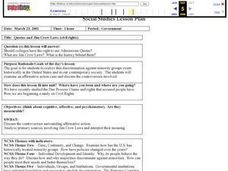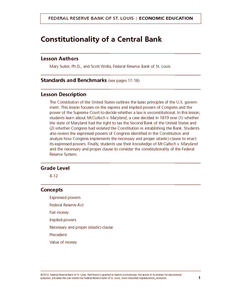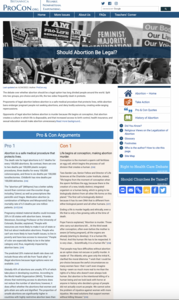Curated OER
Re-Examining Brown
Students explore and describe the impact of segregation on African Americans and other non-white minorities. In this segregation lesson students identify, research and report on the legal cases that led to the Brown vs. Board of...
Curated OER
Dred Scott and the Constitution
Students investigate the outcome of the Dred Scott case. In this human rights lesson, students read Justice Taney's decision about property rights and citizenship. Students write essays about the outcome of the case and President...
Curated OER
Individual Resistance & Social Change
Students examine the Brown v. Board of Education case. In this segregation lesson, students study the details of the case and compare it the Mendez v. Westminster case.
Curated OER
State v. Hershberger
Young scholars examine citizen rights and protections. In this Minnesota courts lesson plan, students examine primary documents from State v. Hershberger and discuss the implications of the decision.
Curated OER
The Living Constitution
Tenth graders explore the Constitution as a "living document." After reading three specific cases, learners consider characteristics that make up a living document. In groups, they conduct guided research on each case. Pupils write a...
Curated OER
Re-Examining Brown
Students identify, research, and report on the people, legal cases and conditions that led to the landmark case, Brown v. Board of Education. They role-play various people from the era preceding 1954.
Curated OER
Hazelwood v. Kuhlmeier
Students read the case text of the Hazelwood v. Kuhlmeier case. Using the text, they discuss the case history and the implications of the verdict. They share their findings with the class in the form of a PowerPoint presentation and...
Curated OER
Race and the United States Constitution
Students examine the topic of race within the United States Constitution. Using case texts, they analyze how the documents deal with the issue of race. In groups, they explore the Court's definitions of citizen. They create a poster...
Curated OER
Quotas and Jim Crow Laws
Students examine the use of quotas and Jim Crow laws. They discuss discrimination against minority groups both historically and in contemporary society. Students examine an affirmative action case and discuss the controversies involved.
Curated OER
The First Amendment
Students participate in a mock trial. Given the scenario, students prepare a cases concerning the freedom of religion, freedom of speech, and the right to assemble. In groups, students prepare an opening and closing statement, as well...
Curated OER
Individual Rights -- Freedom of Speech at School
Students examine their individual rights at a public school. In groups, they identify the most common ways of expressing themselves and why they should limit their speech in public. They compare and contrast two cases in which they...
Curated OER
the Rights of Detainees At Guantanamo Bay
Students identify the legal issues involved in the case of the detainees being held at Guantanamo Bay and surrounding the existence of the base itself. They explain the clash between civil liberties and national security during wartime.
Alabama Learning Exchange
Creating a Psychology News Wiki
If you're searching for a way to keep your class informed of current psychology news, this ongoing assignment is both educational and engaging. Class members locate and read a psychology article of interest, write a psychological...
Minnesota Center for Community Legal Education
Minnesota v. Hershberger
Freedom of religion has been a controversial, yet fundamental, tenet of the United States since even before the nation's birth. In a well-constructed lesson, the class compares the Minnesota Constitution to the US Constitution as a means...
Soft Schools
Civil Rights
Informational text about the Civil Rights Movement challenges young historians to prove their reading comprehension skills with six multiple choice questions. After answers are submitted a new screen displays a score, answers—correct and...
Federal Reserve Bank
Constitutionality of a Central Bank
Considering the expressed and implied powers of Congress, was it constitutional for the United States to establish the Second National Bank in the early nineteenth century? What is the constitutionality of the Federal Reserve System?
Curated OER
Jackie Steals Home
Students draw on their previous studies of American history and culture as they analyze primary sources from Jackie Robinson and Other Baseball Highlights, 1860s - 1960s in American Memory. A close reading of two documents relating to...
Curated OER
U.S. History
In this U.S. history instructional activity, 5th graders complete multiple choice questions about important events in U.S. history. Students complete 5 multiple choice questions.
Curated OER
What is Due Process Anyway?
Students examine the term due process and its historical origins. They compare and constrast the requirements of due process in the United States Constitution and the Indiana Constitution. They also discuss the difference between...
Curated OER
The Changing Meaning of "Due Process"
Students examine the United States Constitution and how the application for due process differs in two amendments. They research the changing definition of the term since the Civil War. They use the internet to research press coverage of...
Curated OER
The Rule of Law
Young scholars examine the rule of law and government in this civics instructional activity. They discover the origins and how it impacts them on a daily basis. They also analyze its role in the judicial system.
K5 Learning
Fight for Equality: Thurgood Marshall
Students read an informational text passage on Thurgood Marshall and his contribution to African Americans' rights, and then answer questions based on what they read.
Curated OER
Abortion
Abortion has remained a highly controversial issue ever since the landmark 1973 Roe v. Wade decision. Using the website, learners sift through all the information they need to participate in a debate about the topic. They learn about the...
Curated OER
Law School vs. School Laws
Students discuss the military's "Don't ask, don't tell" policy regarding sexual orientation and restage the debate leading up to the recent decision in Rumsfeld v. FAIR. They write essays evaluating the merits of the decision.
Other popular searches
- Landmark Supreme Court Cases
- Famous Supreme Court Cases
- Racism Supreme Court Cases
- U.s. Supreme Court Cases
- Supreme Court Cases Poster
- Us Supreme Court Cases

























